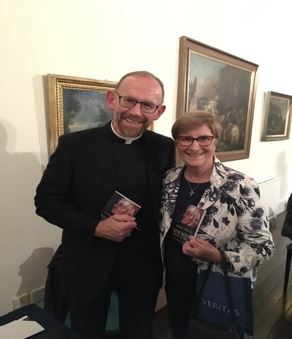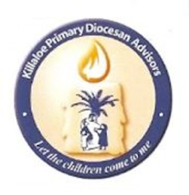Introduction
We have many ways of measuring time and when it comes to my years as Diocesan Advisor in Killaloe diocese I use light-heartedly this measure: I have served with four bishops of Killaloe to date. As Tennyson’s poem The Brook puts it, “For men may come and men may go, /But I go on forever,”!
I returned from the United States in the early 1990’s having served there in various ministries for twenty-five years: teaching every grade in US schools, administrative work, CCD, Rite of Christian Initiation of Adults (RCIA), Baptismal preparation, Parish retreat team and as a Marriage Tribunal auditor.
On my return to Ireland, I received the mission of working in the area of Faith Formation alongside Sr. Benedict Rouine (RIP) in the diocese of Killaloe. In time I was seconded to the Diocesan Advisors team in the area of Primary Schools Catechetics. I am privileged to be still in this position in 2022. My background in Education and Pastoral work in the US as well as my academic qualifications were a very good preparation for my role as Diocesan Advisor. Killaloe also had a good foundation in the area of Primary Catechetics on which I and others were able to build for the future.
Building on the Foundation
My appointment coincided with the Implementation of a new program in the Children of God Series called Alive-O. I was very involved with this program from its outset at consultation level, In-servicing, implementing, and supporting the teachers for the next 15 years.

A first Catechetical Directory for Ireland was launched in 2012 called Share the Good News. This paved the way for the development of a new Primary School Religious Education Curriculum from which was developed a new RE program called “Grow in Love” which was launched in 2015.
Teamwork
Our mission statement is: “To support, educate and resource parents, teachers and those involved in parish leadership in their mutual responsibility for faith development of the child.”
There are three of us in this specific ministry of Diocesan advisor – two women and one man and as a team we cover fifty-six parishes or fifteen Pastoral Areas. I also have responsibility for the Special Schools and many ASD (Autism Spectrum Disorder) classes, a ministry I love dearly.
The number of schools has dropped from 150 to 142 due to closures and divesting to other Patronages. We have four Special schools, six Gaelscoileanna and a few Multi-Denominational Schools. I work in the seventy schools in the Northern end of the Diocese and in the East Clare Region while my two colleagues minister in the West Clare and Gaelscoileanna.
The Actual Work
The work of the Primary diocesan advisor is very hands-on. It demands an approach that is strong on preparation, practicality, and an ability and willingness to encourage others with whom you engage in each school community. One strives always to work with the liturgical season while recognizing the diverse nature of every classroom and the impact of ever-changing world and societal trends.
It is challenging work and sometimes the challenges come from perceptions grounded in the past. For instance, there continues to be a perception among some teachers and some priests that the purpose of a Diocesan Advisor’s visit to a school is to spend time with the children in order to evaluate/examine the work of the teacher. This is a viewpoint that as current advisors we happily relegate to the past.
 Sr. Essie and Bishop Fintan
Sr. Essie and Bishop Fintan
A Child-Centered Dimension
The child is central in all the work we do as Diocesan Advisors. The significance of the classroom visitor in the life of the young child must be acknowledged. Therefore, time spent with the children is an integral part of our visit.
However, when visiting the classroom, a main concern is for the teachers, to respect as well as support them in their role as religious educators. We collaborate with them to ascertain their needs and listen to their views on how the program is working for them on a day-to-day practical level. The teachers and school community are always welcoming to the Diocesan Advisor.
I enjoy my visits to the classroom and am happy when I see the teachers smile as they listen to the children chatting to me about their prayer, relationship with God, Scripture – Bible stories, prayer journal, and the class prayer space. They tell me how they show love at home and at school. They sing a Grow in Love song, sometimes using the prayer movements. Children pray, occasionally using gestures, and they take a moment for Reflection/Meditation. I enjoy answering their little questions about profound mysteries! However, the questions in the senior class can be very tricky at times! It is wonderful to see that many Teachers teach students to have empathy, to have love and compassion and to be merciful.
Another important feature of my ministry is pre-sacramental meetings with parents, in-service meetings with the teachers and clergy in order to introduce and develop understanding of the innovative programs and any other topics relevant to faith-formation. I am happy to provide teachers with resources for liturgies, leaflets for the various Sacramental occasions etc. I stay connected through monthly newsletters and make myself available for their phone calls seeking advice. At all times I share with the teachers a commitment to the primary importance of the child in all our work.
Changing Times
The focus of my ministry has evolved down the years. The school community adapts constantly to a changing environment as we try our best to respond to the needs of the society in which we live. This change is exciting, but it presents its own challenges.
A major issue is that many teachers are struggling with their own faith issues and find it difficult to teach the children the Grow in Love program. They recognise that the children have a right to the knowledge and that they have no right to deprive them of it even though their own faith may be struggling with some of this imparted knowledge. Teachers are well disposed to teaching religion and kind and sympathetic in their methods and this makes it all the more my obligation as a Diocesan Advisor to be equally kind and sympathetic to their personal faith difficulties.
It is wonderful to see so many teachers take their mission very responsibly and imbue the children with a love for Jesus through Bible stories, prayers, meditation, and mindfulness. I cannot praise teachers enough for the magnificent work they do in their classrooms. A positive trend is to witness a growing number of teachers joining ACE (Association of Catholic Teachers) which provides support for teachers.
Some schools are divesting to other Patronages. We have to be realistic and work with this rather than becoming entrenched in our outlook. Developments are slow in this area, but we must accept that it will increase over time, and we should be preparing ourselves to adapt to it in a creative and open manner.
Another big change in schools is the growing number of children from other faith traditions, and children opting out of RE altogether. Nonetheless, those children from faith traditions other than Christian are (with the consent of their families) welcome to take part in the Grow in Love programme. They can learn about and from the Christian Tradition, just as Catholic children can learn about and from those children’s religious traditions. The religious tradition or life stance of every child should be respected fully in the classroom and in the school.

The Future:
Pope Francis acknowledges that the home is the most important place to transmit the faith. However, families need support from the parish community, and this is lacking in our parishes. The synodal pathway is providing an opportunity for us to understand new ways of handing on the faith. Twenty-four lay ministers were commissioned last Easter to minister in the diocese of Killaloe. This is a positive new dimension that will in time share with teachers and parents the responsibility for faith- formation.
The future of Primary Catechetics is an uncertain future, but we trust to the Holy Spirit and our willingness and eagerness to go where the Spirit will lead us. The experience of Covid gave all of us time to reset and rethink how we experience our faith. I see that the focus has to be on experiencing Faith, not just teaching it. Most children are well taught and educated when it comes to RE. However, the connection between the head and the heart is often missing. Perhaps it is here that we trust to the Holy Spirit who will guide us and future generations to make that journey between head and heart – to translate word into action or in the language of our faith allow the word become flesh.
Conclusion

The Catholic Church for its part is keen to engage and not retreat from religious education in schools. It sees the importance of imparting to the next generation Christian values that will both help the individual and benefit the society of the future. However, there is not full agreement with State support for faith schools. Many see religious education as something separate from and to be separated from Primary Schools. This debate will continue for some time to come.
The Diocesan Advisor continues to play a key role sharing information that will enhance the ethos, faith, religious education, management, and evangelization of Catholic Primary Schools. The Diocesan Advisor’s work is rooted in the present with a keen eye to the future. My own ministry continues to be a blessing for me, and I feel so privileged to accompany teachers, parents, and clergy in this important ministry. My own faith gives me a sense of hope for the future and a humble wish to love all whom I encounter in my work.
Essie “Esther” Hayes rsm
South Central Province


